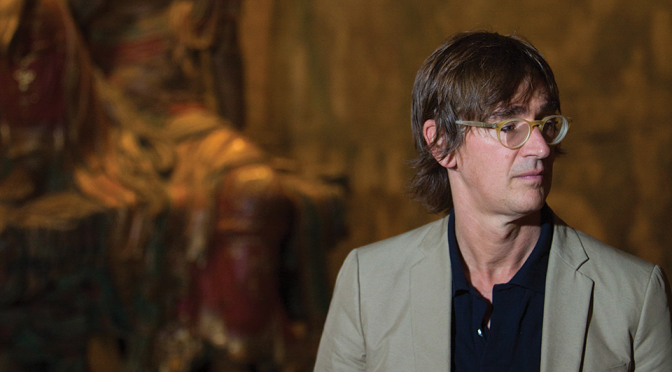Death may be the ultimate example of a universal human experience. So, can our thinking about death – the anxiety we experience about our own, the grief we feel about others’ – lead us to a universal ethics of compassion for our fellow humans?
That’s what Clancy Martin, Ph.D., is exploring in his current research endeavor as a professor of philosophy at UMKC.
“I’m working on a project at the intersection of ethics and the philosophy of mind (two branches of philosophy – see sidebar), and at the intersection of Western philosophy and Eastern philosophy,” Martin explains.
“The idea – that comes from the work of the eighth-century Buddhist philosopher Shantideva and the nineteenth-century Danish philosopher Soren Kierkegaard, with a bit of help from Jean Paul Sartre – is that part of our experience of consciousness, when we look at it in its most fundamental nature, is the experience of compassion for other consciousnesses.”
Martin’s research involves exploring the relationship between compassion and death – how the mind relates to death, and how we feel about anxiety and suffering. The goal is to give people a reason, and a means, to think and act more compassionately.
“It would be nice if we could make this work,” Martin says. “We’re always looking for a grounding principle to support whatever moral system we might postulate.”
In addition to working in the philosophy department at the College of Arts and Sciences, Martin is also a professor of business ethics at the Henry W. Bloch School of Management. A 2011-12 Guggenheim Fellow, Martin has authored, coauthored and edited a variety of books in philosophy, including Love and Lies, Honest Work with Robert Solomon and Joanne Ciulla, and The Philosophy of Deception. His work has been translated into more than 20 languages.
How does one conduct academic research into such topics? It doesn’t involve test tubes or computer modeling, but it is far more rigorous than mere deep thinking in a quiet room.
Martin says he begins by reviewing “how great minds of the past looked at these issues. Then you check that against your own intuition about the issue, and against contemporary debate on the issue” by philosophers in forums and published works.
The next step is to construct a hypothetical conversation with one of the great thinkers of the past about the contemporary concerns relating to the issue. That leads to a draft manuscript.
“You then pass that around to people you respect, to get their feedback and their concerns,” he says.
Some of those reviewers are other academics in philosophy. And some are not. Among those from whom Martin regularly seeks insight and reactions are a photojournalist at National Geographic, an economist at MIT, a novelist and a jeweler.
“I try to involve as many different thinkers from as many different disciplines as possible,” he says.
For this particular research effort, he has expanded his circle of discussion partners to include people who work professionally with death and dying, including hospice workers and physicians.
“I’m reading works written by people who are dying and writing about their experiences, and people who are writing from the perspective of grief over losing a loved one,” Martin says. In his reading of the works of his two primary sources, Martin says he has been struck by how remarkably similar he has
found the thoughts about death put forward by Shantideva and Kierkegaard, who lived centuries and continents apart.
“For a long time, we in the West have ignored the important contributions of Eastern philosophers, to our great loss,” Martin says, adding that Eastern academics have similarly ignored the West. “I am hoping to make more progress than I otherwise might, by drawing on these two great traditions.”
“It’s a fun project, in part, because many of the best Buddhist scholars and working philosophers are in India, and, in addition to working together over email, I travel to monasteries and other religious centers in the Himalayas, India and Nepal, to study with them,” Martin says. “It’s resulted in various papers and essays and is slowly maturing into a book.”

